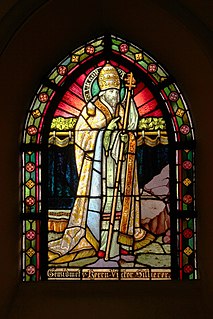Related Research Articles

Pope Victor I was the bishop of Rome in the late second century. The dates of his tenure are uncertain, but one source states he became pope in 189 and gives the year of his death as 199. He was the first bishop of Rome born in the Roman Province of Africa—probably in Leptis Magna. He was later considered a saint. His feast day was celebrated on 28 July as "St Victor I, Pope and Martyr".
Quartodecimanism is the practice of celebrating Easter on the 14th of Nisan. Quartodecimans celebrated Easter on the Passover instead of Sunday. Some want to call the Quartodeciman controversy the "Passover-Easter controversy", because the debate was about if the main Christian festival should happen on a day of the month or on a specific day of the week (Sunday). During the controversy the issue of an annual Eucharist celebration was not questioned, additionally the day of the resurrection was not in question. Quartodecimans would also not condemn celebrating the resurrection of Jesus.

The Greek Orthodox Patriarchate of Jerusalem, also known as the Greek Orthodox Church of Jerusalem, and sometimes known as the Church of Zion, is an autocephalous church within the wider communion of Eastern Orthodox Christianity. Established in the mid-fifth century as one of the oldest patriarchates in Christendom, it is headquartered in the Church of the Holy Sepulchre in Jerusalem and led by the Patriarch of Jerusalem, currently Theophilos III. The Patriarchate's ecclesiastical jurisdiction includes roughly 200,000 to 500,000 Orthodox Christians across the "Holy Land" of Israel, Palestine, and Jordan.

Simeon of Jerusalem was a Jewish Christian leader and according to most Christian traditions the second Bishop of Jerusalem, succeeding James, the brother of Jesus. Simeon is sometimes identified with Simon, a brother or cousin of Jesus, and has also been identified with the Apostle Simon the Zealot.

Alexander of Jerusalem was a third century bishop who is venerated as a martyr and saint by the Eastern Orthodox Church, Oriental Orthodox churches, and the Roman Catholic Church. He died during the persecution of Emperor Decius.

Saint Narcissus of Jerusalem was an early patriarch of Jerusalem. He is venerated as a saint by both the Western and Eastern Churches. In the Roman Catholic Church, his feast day is celebrated on October 29, while in the Eastern Orthodox Church it is celebrated on August 7.
Saint Zacchaeus of Jerusalem is a 2nd-century Christian saint venerated by the Roman Catholic and Eastern Orthodox churches. Also known also Zacharias, he was the fourth Bishop of Jerusalem. His feast day is August 23.
Saint Matthias of Jerusalem was a 2nd-century Christian saint and a Bishop of Jerusalem, whose episcopacy was about 113–120 AD.

The Church History of Eusebius, the bishop of Caesarea was a 4th-century pioneer work giving a chronological account of the development of Early Christianity from the 1st century to the 4th century. It was written in Koine Greek, and survives also in Latin, Syriac and Armenian manuscripts.

Early Christianity spread from the Levant, across the Roman Empire, and beyond. Originally, this progression was closely connected to already established Jewish centers in the Holy Land and the Jewish diaspora. The first followers of Christianity were Jews or proselytes, commonly referred to as Jewish Christians and God-fearers.
Justus I Bishop of Jerusalem, whose Jewish name is Judas, was a 2nd-century Jewish Christian leader and according to most Christian traditions the third Bishop of Jerusalem, whose episcopacy was about 107–113 AD. He succeeded Simeon the son of Clopas who died crucified in 107/108, or in 115-117. He is probably a son of James the Just, the brother of the Lord. His successor Zacchea I is also called "the Righteous", since this is the meaning of the Aramaic Zakka.
Tobias Bishop of Jerusalem, was the 2nd Century, fifth Bishop of Jerusalem. He was acquainted with Thaddeus who was involved in healing, being one of the Seventy. According to Eusebius he was a Jewish Christian born to Jewish parents, who kept the Law of the Torah. His feast day is on Dec 17.
Benjamin I of Jerusalem was the 2nd-century 6th bishop of Jerusalem. According to Eusebius of Caesarea he was a Jewish Christian. His short episcopacy was only from about 116 to 117 AD. He was possibly killed in the persecution of Hadrian (117–138), His Feast Day was December 11.
Philip Bishop of Jerusalem, was a 2nd-century Jewish Christian leader and Bishop of Jerusalem, whose episcopacy was about 120-124AD.
John I of Jerusalem was the seventh Bishop of Jerusalem.
Justus II of Jerusalem was a 2nd-century Jewish Christian bishop of Jerusalem.
Levis of Jerusalem was a 2nd-century Jewish Christian bishop of Jerusalem.
Ephram of Jerusalem was a 2nd-century Jewish Christian bishop of Jerusalem.
Senecas of Jerusalem was a 2nd century Jewish Christian bishop of Jerusalem.
This is a list of the bishops of Jerusalem before the Council of Chalcedon (451), which provoked a schism.